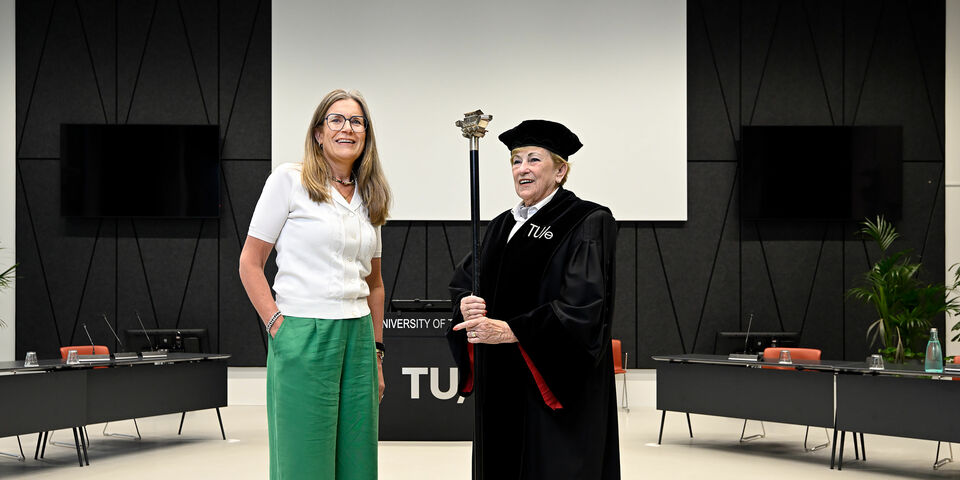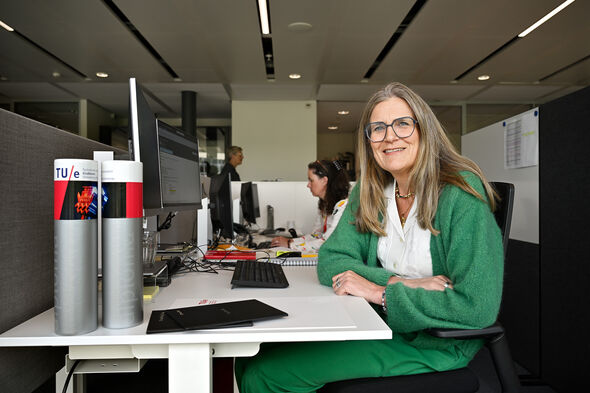Behind the Scenes | Femke Witteveen, PhD defense coordinator
From technicians to schedulers and from IT staff to cafeteria workers: it takes a lot of hands to keep TU/e running smoothly. Who are these people behind the scenes? In this series, Cursor shines the spotlight on TU/e employees. This time: Femke Witteveen, coordinator of the Office of Doctoral Presentations and Academic Ceremonies.
As coordinator of the Office of Doctoral Presentations and Academic Ceremonies, Femke Witteveen is responsible for the organization of all PhD defense ceremonies at TU/e. And there are quite a few of those – almost four hundred a year. To ensure that everything runs smoothly and according to the rules, a lot has to be arranged: from scheduling a beadle to arranging the photographer and drawing up and checking all the official documents. A responsible position with many tasks, but arranging everything well and bringing it to a successful conclusion gives Witteveen great satisfaction. “I enjoy working with and for people.”
What time do you clock in?
“My alarm clock goes off at six o’clock. I jump in the shower, get dressed, put on my make-up, and go into the woods with our dog before biking to work. Almost every day I’m in before eight. I turn on the computer, have a cup of coffee, and check my to-do list for the day. It’s still nice and quiet at this time of day, I never hear more than a few voices in the secretarial office and the open-plan office where I work.”
What does your job involve exactly?
“At the Office of Doctoral Presentations and Academic Ceremonies, we organize PhD defense ceremonies and everything that comes with them. We’re also responsible for PDEng ceremonies and the inaugural and valedictory lectures. We work together: my colleague Monique focuses mainly on the lectures, I mainly on the PhD defense ceremonies.”
“PhD candidates only appear on our radar in the final phase of the process. After years of research, their dissertation is finally ready and approved, and then we help steer the entire process towards the PhD defense in the right direction. Not in terms of content, but mostly in terms of following all the steps and rules.”
“No two days are the same in my job. I often start by checking doctoral committees. These must comply with the doctorate regulations, and if everything is correct, I submit them to the Doctorate Board. Distinction proposals also come to me; I submit them to the cum laude committee and then monitor follow-up.”
“Furthermore, I compile the activity calendar, which includes all PhD defense ceremonies and inaugural and valedictory lectures, but also master’s and PDEng graduation ceremonies. And then there’s checking title sheets – that’s really painstaking work sometimes. You have to check everything: the name and birthplace of the PhD candidate, the country of birth for the title page, date, time, the committee members and their initials, titles, and affiliations, and of course the standard texts.”
“I also make the schedule for the beadles and prepare the documents for PhD defense ceremonies that take place two weeks later. For each PhD candidate, I prepare the diploma, the English statement, the register sheet, and the nametag, and I arrange the catering for the ceremony.”
“In addition, I get emails with all kinds of questions and notifications from Hora Finita – the system in which everything to do with PhD defense ceremonies is recorded – which I have to approve so that the process can continue. It’s a versatile job, with a lot of variety and responsibility.”
What led you to this job?
“I've had various roles at TU/e over the past fifteen years, including positions in HR, the Electrical Engineering department, and at innovation Space. When my predecessor wanted to make an internal switch, I did some job shadowing with her a few times and thought: this sounds like something I would like to do! I had mainly held supporting roles, but this was a chance to run 'my own shop’. As a secretary within the department I had already built some experience with PhDs and I enjoyed working with PhD students. What did surprise me was how many PhD defense ceremonies there are and how much work is involved. I didn’t expect that!”
What is the best part of your job?
“For me, it’s the contact with different people: from international PhD candidates, PhD supervisors, deans, the rector, beadles, and the cum laude committee to different secretarial offices, catering, audiovisual support, reception, LIS, HR… As I’ve worked in many places, I know my way around and that helps tremendously.”
A pregnant PhD candidate who asks if a chair can be arranged, or someone who asks for an XXL-sized gown – it makes my work varied and challenging
“I attach great value to service provision and customer friendliness. That’s why I always try to give PhD candidates good information, and assist, reassure, and accommodate them. In those last weeks before the defense, PhD candidates are often under a lot of pressure. I like it when I can help them by taking some worries out of their hands.”
“What I also like is that I always have a good overview of my work. A lot of tasks come back regularly, and you can tick them off. That makes me happy and gives me a sense of fulfilment.”
“Besides those regular tasks, I also get all kinds of requests from different people. It’s nice to be able to meet those. Whether it’s a secretary who gets stuck in the Hora Finita system, a PhD candidate who wonders what kind of clothing is appropriate, a pregnant PhD candidate who asks if a chair can be arranged so she can sit down during the ceremony from time to time, or someone who asks if I can arrange an XXL-sized gown – it makes my work varied and challenging.”
And the least enjoyable part?
“With more PhD defense ceremonies than days in the year, we’re basically busy all the time: lots of tasks and tight deadlines. Running ‘your own shop’ is fun, but this shop never closes and I feel responsible. So even when it’s busy, I want to help customers as quickly as possible – and sometimes that means turning on my laptop in the evening or on a day off. Going on vacation or simply taking a day off can sometimes be quite difficult. If the Office of Doctoral Presentations doesn’t give the green light, a PhD candidate might not be able to continue, and that would feel bad.”
“I would also like to see the Office of Doctoral Presentations becoming a bit more well-known. Now we’re hard to find and there’s little direct contact with PhD candidates. It has only happened a few times that someone actually dropped by – I thought that was great and admirable, so assertive! Ideally, I would like to have an open-door office so PhD candidates and supervisors can just walk in. Fewer emails, more real contact – that seems ideal to me.”
What time do you clock out?
“Every day I resolve to leave on time, but often I don’t switch off my laptop until around 5:30 PM. Then I enjoy riding my bike home: about nine kilometers to get some fresh air and clear my head. My husband likes to cook, so generally I can just take a seat at the dinner table, with a dog at my feet who’s eagerly anticipating a walk around the block after dinner – something we both need.”
What do you do off the clock?
“I don’t like to sit still in my free time either. Road bicycle racing is one of my greatest passions – I do that two to three times a week. This summer I’m going cycling to the south of France with my husband, so we need to put in the miles. I also like to meet up with friends – chatting, drinking, and eating together. On the weekends, I like to be outside and often browse thrift and vintage shops to find ‘treasure’. Most of my clothes and furniture are secondhand. As this hobby can sometimes get out of hand, I have one rule: if I bring something in, I have to get rid of something else.”



Discussion